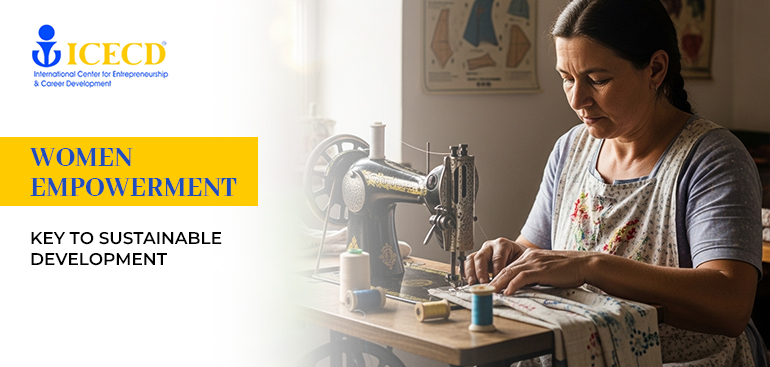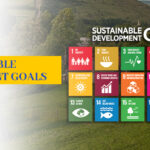In the journey toward a sustainable future, one truth stands clear—no development is truly sustainable without the empowerment of women. As half of the world’s population, women play a crucial role in shaping economies, building communities, and protecting the environment. Yet, millions remain excluded from access to education, economic opportunities, and decision-making roles.
At ICECD (International Centre for Entrepreneurship and Career Development), we believe that empowering women is not just a social objective—it’s a strategic imperative for sustainable development. In this blog, we explore the deep link between women’s empowerment and the global sustainability agenda.
What is Women Empowerment?
Women empowerment means enabling women to have equal access to education, healthcare, work opportunities, financial independence, legal rights, and leadership roles. It’s about breaking systemic barriers, challenging stereotypes, and giving women the tools and freedom to shape their own lives and communities.
Empowerment is economic, social, political, and psychological – and it’s essential for achieving gender equality and sustainable development.
Why is Women Empowerment Critical to Sustainable Development?
The United Nations Sustainable Development Goals (SDGs) clearly recognize the centrality of women’s empowerment, especially under Goal 5: Gender Equality. But the impact of empowering women goes far beyond just one goal—it contributes to all 17 SDGs, directly or indirectly.
Here’s how:
1. Ending Poverty (SDG 1)
When women earn and control income, household poverty declines. Empowered women invest in health, nutrition, and education—breaking the cycle of intergenerational poverty.
2. Improving Health and Education (SDGs 3 & 4)
Women who are educated and economically empowered are more likely to access healthcare, send their children to school, and advocate for community health initiatives.
3. Fostering Economic Growth (SDG 8)
Gender equality in the workforce boosts GDP. Studies show that closing the gender gap in labor force participation could add trillions to the global economy.
4. Sustainable Agriculture and Food Security (SDG 2)
Rural women are essential to agriculture. Empowering them with land rights, credit, and training improves food production and sustainable farming practices.
5. Climate Action and Resource Management (SDG 13)
Women are often the primary stewards of natural resources in rural areas. Their knowledge and leadership are vital to climate resilience and environmental conservation.
Barriers to Women’s Empowerment
Despite progress, several challenges hinder the empowerment of women in India and across the globe:
- Patriarchal mindsets and gender norms
- Limited access to education and digital literacy
- Wage disparity and occupational segregation
- Lack of access to finance and business networks
- Underrepresentation in leadership and policymaking
Addressing these barriers requires targeted interventions, inclusive policies, and community-driven efforts.
ICECD’s Role in Women Empowerment
Since 1986, ICECD has been at the forefront of women-centric development in India and internationally. Our work aligns with multiple SDGs and focuses on empowering women through entrepreneurship, skill-building, and financial inclusion.
Key Interventions:
- Women Entrepreneurship Development Programs: Training women to start and scale microenterprises in sectors like handicrafts, food processing, textile, agri-business, and services.
- Financial Literacy & Microcredit Access: Facilitating access to credit, business planning tools, and market linkages.
- Skill Development for Rural Women: Offering vocational and digital training programs tailored to rural and semi-urban contexts.
- Community Leadership & Awareness Campaigns: Building confidence and agency among women to become changemakers in their communities.
ICECD has empowered over 10,00,000 women in India and abroad, building an ecosystem of inclusive growth and sustainability.
Empowering Women for a Better Tomorrow: The Way Forward
To truly achieve sustainable development, we must:
- Invest in girl child education
- Ensure equal pay and workplace dignity
- Promote women in leadership, governance, and innovation
- Support women-led businesses and self-help groups
- Strengthen laws around gender-based violence and discrimination
Empowering women isn’t a women’s issue—it’s a human issue. When women thrive, families prosper, communities grow, and nations progress.
Join the Movement: Enroll in ICECD’s Sustainability Course
To drive meaningful impact, ICECD also offers a Certificate Course in Sustainable Development, with a strong focus on gender inclusion and community empowerment.
Certificate Course in Sustainable Development
Duration: 6 Weeks | Mode: 100% Online | Ideal for: Educators, Students, NGOs, CSR Professionals
This course helps participants:
- Understand the 17 SDGs through a gender lens
- Learn women-centric strategies for climate resilience and rural development
- Build frameworks for inclusive and participatory sustainability
Conclusion
Empowering women is more than a milestone – it’s a multiplier. It accelerates progress on every front: health, education, economy, and environment. At ICECD, we continue to champion a future where women are not just beneficiaries, but leaders of sustainable change.
Also read:



